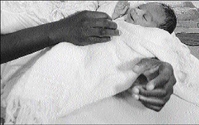Dead within days after birth
Published: Sunday | June 28, 2009

A baby born at the Spanish Town Hospital, weighing 2.1kg. - Ian Allen/Staff Photographer
WHEN LEROY and Marva Gordon found out that they would be having a, baby, they were naturally overjoyed. After six years of marriage, the couple had been planning for several years to start a family.
Little Azaliah Gordon was born premature at 25 weeks at the University Hospital of the West Indies (UHWI), St Andrew, on July 31, 2007. The Gordons said doctors told them that the baby had a 70 per cent chance of survival.
"We were hopeful, this was our first child and we would do anything in our power to keep her alive.
"Our problems started right after she was born, as the hospital told us no ventilators were available," Gordon said.
At the time, the Neonatal Intensive Care Unit (NICU) at the UHWI only had four ventilators; two were out of service.
makeshift instrument
Baby Azaliah spent three days without a ventilator before one became available. During that time, she was assisted with breathing through the use of a continuous positive airway pressure machine (CPAP). The CPAP machine is a makeshift instrument used to supply new-borns with oxygen, however they are still breathing independently.
"By day five, we were told that the oxygen wasn't flowing to one side of her lungs so they would have to do surgery," Gordon said.
Doctors successfully operated on the baby. She was now breathing properly, but the Gordons were immediately faced with more bad news. The doctors told them that at 25 weeks, Azaliah was too young to feed on her own.
Azaliah's only hope was a form of supplement called total parenteral nutrition (TPN) which is often used in situations where an individual is too weak or in her case, too young, to digest on its own.
The Gordons said they were told that this procedure was no longer administered at the UHWI because it was too costly to maintain.
"We were told that the money that could be used to provide TPN for a couple of premature babies could be used to supply the hospital with medication that was used on a daily basis," the couple related.
Hospital staff advised the parents to fly the baby off the island to access TPN treatment.
Just to hire an air ambulance to Miami they were expected to fork out approximately US$25,000 ($2.2 million). This did not include hospital charges, accommodation costs for the parents, and the cost of the TPN applications.
The parents' next option was to get the TPN to their baby girl. This, too, was a problem, as there were no facilities in place to provide the service. "The hospital didn't have a sterile facility in which the TPN could be prepared and given to the child," the couple said.
shortage
However, before the Gordons were able to get the TPN to baby Azaliah, she passed away three weeks after birth.
Azaliah's death certificate reads: "Died from multiple system organ failure, cardiac failure, extreme prematurity and renal failure."
The Gordons said they believe that the hospital's efforts were significantly thwarted by a shortage of the necessary tools and equipment.
"The fact is that the UHWI and other hospitals in Jamaica are not equipped to deal with premature births," they said.
The Gordons aren't the only parents who have such a concern. In fact, The Sunday Gleaner made contact with at least four couples with similar stories, all of whom have lost at least one premature child in a major hospital in Jamaica within the last three years.
Thirty-year-old Colin Jonas and his 23-year-old girl friend, Ava Brooks, share a similar experience. The couple has lost three children in less than two years. Baby Megan, who was born at seven months on August 8, 2007, but died 53 days later and 24 week-old twin boys who passed away on April 2, 2008, within several hours of birth. All three children were born at the UHWI.
Popular gospel artistes Ryan Mark Reynolds, also known as Prodigy, and wife, Dawnette 'Crissy D' Reynolds, have started a fund in the name of their daughter, Ruth Reynolds, who died on January 13, 2008, at the Bustamante Hospital for Children just three days after birth.
There were also no ventilators available at the Victoria Jubilee Hospital when Ruth was born. "How we even got that machine at Children's was because the baby who was on it had expired and because we were on the air making a plea," Prodigy informed. "But if you think of other people who are not really known to society, you can imagine how they suffer," he said.
athaliah.reynolds@gleanerjm.com








